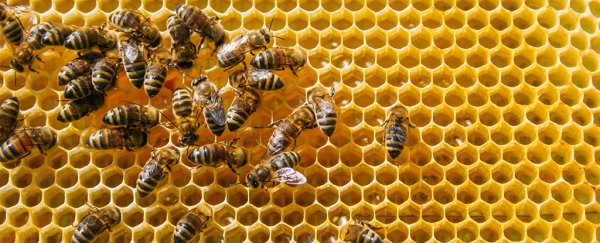The fact that nothing can be counted as something – what we humans call zero – isn't exactly common knowledge across the animal kingdom.
New research suggests the humble bee can be taught to recognise nothing as an amount, which considering they can also count as high as four, makes them veritable arthropod accountants.
Biologist and bee enthusiast Scarlett Howard from Melbourne's Royal Melbourne Institute of Technology presented her latest findings on bee number-sense at the recent Behaviour 2017 meeting in Portugal.
Counting usually refers to an ability to add units to an infinite sequence, something most human cultures do.
For animals and human infants, a more basic form of pre-counting is referred to as subitizing. While a few animals can do this, it's rare for zero to be considered part of this process.
To be clear, zero is a complicated term. Mathematically speaking, the recognition of a blank number value has revolutionised how we measure and model the Universe by using it as a placeholder to describe sets of numbers in detail.
As far as subitizing goes, even the concept of an absence representing an amount is high level stuff. Certainly not something expected of an insect.
To test their potential, Howard and her colleagues trained bees to identify locations with fewer objects by associating them with a sweet reward, and to avoid locations with more objects by providing a nasty sip of quinine.
This carrot-and-stick approach meant bees could soon recognise the difference between more and less objects about 80 percent of the time.
We mightn't be talking insect Newtons here, but this simple ability to distinguish between even low quantities isn't prevalent outside of mammals and birds. Cuttlefish are known to be able to recognise distinct amounts up to five, but among insects this simple counting skill makes bees rather unique.
What was truly amazing was if nothing was placed on one platform and two or three shapes were placed on the other, the bees still regarded this as a valid choice, flying towards the empty space.
In a follow-up experiment, Howard and her team gave the bees a choice between a platform with nothing and one with between one and six objects.
While they still preferred zero, they took more time to decide and were less accurate if zero was up against fewer objects, almost as if the decision was a little more challenging.
The research is yet to undergo peer review, and exactly what the conclusion means is up for debate.
Having a simple number sense of one to four might help them keep track of landmarks in their collection duties over long distances, but would a 'zero' category be of much use?
"We still have some things to figure out about why they can do this," says Howard, according to New Scientist.
There's no doubt that those tiny bee brains are capable of some pretty incredible computing.
Scientists from Queen Mary University in London recently taught bees to move a ball into a goal for a sugary reward in what is clearly an attempt to enter the first insect team into the next FIFA World Cup.
They state that their research is evidence that even simple neurological systems are capable of impressively complex behaviours.
"What's more, neurobiology and modelling research suggests that a very limited number of neurons (even just a few) can accomplish some rather complex cognitive tasks," the researchers argue.
Just what other animals are capable of knowing something about a whole lot of nothing is left to be seen.
